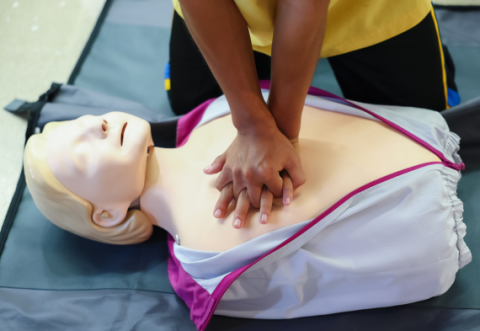
What is Restart a Heart?
Restart a Heart (RSAH) is an annual initiative led by Resuscitation Council UK (RCUK) every October, which aims to increase the number of people surviving out-of-hospital cardiac arrests by improving cardiac arrest awareness and CPR education.
With support from an alliance of partners all over the world (including UK Ambulance Services, universities, and other charitable and public sector community-based organisations and first aid training organisations) we help organise and facilitate training events, as well as provide opportunities for people to learn CPR and defibrillation digitally in the safety and comfort of their own homes.
You can expect to see Restart a Heart events happening throughout October, and on Restart a Heart day on 16 October.
Whether you're hosting an event or attending one, teaching in person or learning online, you have a key role to play in improving survival rates from out-of-hospital cardiac arrest. You can ensure that everyone has a chance to learn the steps to CPR and how to use a defib and that those having a sudden cardiac arrest have their best chance of surviving.
Everyone has the power to help in a cardiac arrest
In 2025, our Restart a Heart campaign focused on encouraging everyone to learn CPR, but more importantly, it highlighted that anyone, regardless of physical ability, can play a vital role in the chain of survival.
We teamed up with former Royal Marine and Invictus Games athlete Mark Ormrod MBE, along with the Amputation Foundation, to help spread this important message across the UK. While chest compressions are one part of CPR, the campaign emphasised that every action counts when someone is in cardiac arrest, from shouting for help to guiding someone to get a defibrillator.
The core message from RCUK, Mark, and the Amputation Foundation was simple - you don’t have to do everything, doing something can save a life.
Even if someone can’t physically perform chest compressions, they can still play a vital role in the chain of survival by:
- Calling out for help (shout)
- alerting emergency services (call 999)
- telling someone to get a defibrillator (guide)
- supporting or coordinating CPR efforts.
Restart a Heart will be back in 2026!
Restart a Heart may be one month a year but our work to ensure everyone has lifesaving skills continues year round. You can take part, no matter what time of year it is, by learning CPR, supporting our campaign work, or donating to help us continue our lifesaving work.



